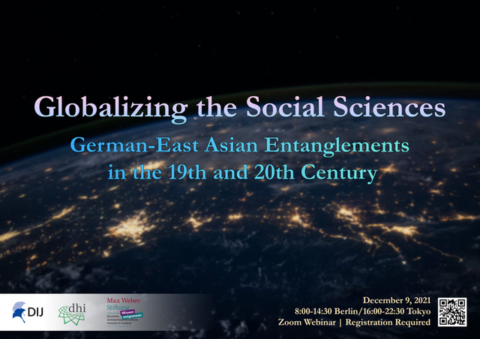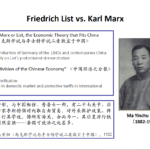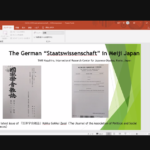
Download
Co-organizer


In cooperation with the German Historical Institute Rome and the China Branch Office of the Max Weber Foundation
Anmeldung
This is a past event. Registration is no longer possible.
Please subscribe to our DIJ Newsletter to stay informed about our research activities, events, and publications:
Globalizing the Social Sciences
German-East Asian Entanglements in the 19th and 20th Century
9. Dezember 2021
Conference Report (PDF)
At the end of the nineteenth century, Germany was widely recognized as the premier place to study political economy, law, and social sciences as summarized under the umbrella term of Sozialwissenschaften. With the relatively state-centric perspectives and the tendency to grasp society in the context of the interplay of institutional, economic, and psychological factors, the German Sozialwissenschaften significantly influenced elites from the so-called “catch-up countries” such as Russia, Japan, China, and Southern Europe, and became the standard reference for scholars from these countries, in some cases even until after WWII.
Much has been written on the circulation and recontextualization of German-language scholarship in the „catch-up countries“. Most of this has been from a bilateral perspective that conceptualizes the knowledge transfer as a linear process, and therefore it overlooks the multinational personal links and multi-fold intellectual entanglements in the context of the globally rising theoretical quest for connections and correlations of empirical facts.
In cooperation with the German Historical Institute Rome and the China Branch Office of Max Weber Stiftung, the German Institute for Japanese Studies in Tokyo took the occasion of this year’s 160th anniversary of German-Japanese Friendship as an opportunity to reexamine the legacies and pitfalls left behind by the German Sozialwissenschaften in East Asia from historical and transnational perspectives.
Programme
Chair: Stefan Keppler-Tasaki (The University of Tokyo)
Opening Remarks: Franz Waldenberger/Yufei Zhou (DIJ Tokyo)
Keynote Speech: Mishima Ken’ichi (Osaka University)
Zum deutsch-japanischen Transfer der Sozialwissenschaften: Rezeption, Eigenentwicklung, Sekten-Abkapselung
Wolfgang Schwentker (Osaka University)
Wechselwirkungen: Odaka Tomoo und die deutsche Soziologie um 1930
Egas Moniz-Bandeira (Max-Planck-Institut für Rechtsgeschichte und Rechtstheorie)
Adopting German Law to Counter Western Influences: Chinese Diplomats, Students, and Revolutionaries in Early 20th-Century Berlin
Christina Philips (Max Weber Stiftung, China-Büro)
Zur Rettung Chinas? Chinesische Studierende und Sozialwissenschaften im Deutschland der Zwischenkriegszeit
Yufei Zhou (DIJ Tokyo)
The German Impact on the Economic Thought in Republican China
Discussant: Zhang Chunjie (University of California, Davis)
Chair: Stefan Keppler-Tasaki (The University of Tokyo)
Carlo Taviani (Deutsches Historisches Institut in Rom)
Forging the Business Corporation: Interpretation of Medieval Organizational Forms by the Historische Rechtsschule, and its Legacy in Japan
Takii Kazuhiro (International Research Center for Japanese Studies)
The German “Staatswissenschaft” in Meiji Japan
Onozuka Tomoji (The University of Tokyo)
Lujo Brentano and Social Sciences in Japan between 1890s and 1940s: Social Statistics, TAKANO Iwasaburō and FUKUDA Tokuzō
Erik Grimmer-Solem (Wesleyan University)
Empirical Empire: Karl Rathgen, Kanai Noboru, and the Development of Applied Social Science in Japan
Tsuneki Kentarō (Senshu University)
“Becoming” (Werden) and “Being of Having Become” (Gewordensein): Criticism of Max Weber in Japan during WWII
General Discussion
Closing Remarks

